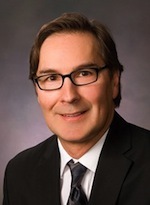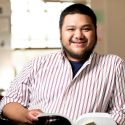New employee assistance consultant ready to help
A problem doesn’t have to be big before a person reaches out to the Employee Assistance Office. In fact, it’s better if it isn’t.
“We need to take care of ourselves always – and address issues early,” says Charles LaTorre, a consultant in the office.

Charles LaTorre
The Employee Assistance Office assists faculty and staff with maintaining and enhancing both their professional and personal lives. It offers services to promote emotional well-being and respectful, productive work environments.
LaTorre came to UW–Madison in July after living in Green Bay for 15 years and working for an external employee assistance program. He has a bachelor of science in psychology from Marywood University and a master’s degree in social work from the University of Houston.
LaTorre always liked the idea of working in an academic environment.
“There’s something really invigorating about being here,” he says.
One of his goals is to make people on campus aware of the services offered to employees and to encourage them to seek help before a situation becomes potentially more difficult to manage.
“People are starting to understand there’s no problem too little. If it’s big enough for you to want to talk about, it’s big enough for you to come in.”
Charles LaTorre
“People are starting to understand there’s no problem too little. If it’s big enough for you to want to talk about, it’s big enough for you to come in,” LaTorre says. “The world doesn’t have to be coming to an end. The earlier on, the better.”
EAO provides timely assistance to faculty and staff and their family members or significant others as they work through life changes, improving interpersonal relationships, work/life balance concerns and physical or emotional health issues.
The service is free and completely confidential.
Examples of assistance include:
- Individual counseling
- Marital/relationship counseling
- Workplace consultation
- Educational programs
LaTorre is happy to see more attention being paid to mental health in the workforce and hopes our workplace will become even more proactive about such issues.
His clinical work focuses on personal resilience, well-being and the ability to increase emotional self-regulation. Through mindful awareness, the goal is for clients to achieve health and happiness.
“Resilience is part of our overall well-being,” LaTorre says. “It’s what makes us flourish and thrive.”
“We all have some level of resilience and our resilience is tested in how we deal with adversity, as well as how well we bounce back. Sometimes we not only bounce back, but we might become even stronger as a result of the experience.”
While people often think about how they’re doing physically, LaTorre encourages a little thought about how we’re doing mentally. “Mental health is such a big part of our well-being, but so often overlooked compared to the physical dimension.” LaTorre says. “We need to take care of ourselves emotionally as well as physically, and understand the relationship between the two to maximize our well-being.”
Tags: employee news, faculty and staff



